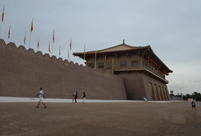 In pics: YOG prism
In pics: YOG prism
 Amputee girl reaches top of half-left tower in Jiangxi
Amputee girl reaches top of half-left tower in Jiangxi
 Yardangs in Lop Nur
Yardangs in Lop Nur
 Intoxicating Ayding Lake in Xinjiang
Intoxicating Ayding Lake in Xinjiang
 Beijing's MJ impersonator a 'thriller' for crowds
Beijing's MJ impersonator a 'thriller' for crowds
 Armed police compete on the plateau
Armed police compete on the plateau
 Rubber Duck settles in Guiyang new urban area
Rubber Duck settles in Guiyang new urban area
 Rare set of giant panda triplets turn one month old
Rare set of giant panda triplets turn one month old
 Closing ceremony of Youth Olympic Games
Closing ceremony of Youth Olympic Games
 Attractive posters to welcome freshmen
Attractive posters to welcome freshmen
BEIJING, Aug. 31 (Xinhua) -- China's top legislature on Sunday adopted a revision to the Budget Law which clears ambiguity and closes loopholes in managing the trillions of yuan involved in fiscal revenue and spending.
This is the first time the Budget Law has been revised since it took effect in 1995.
As the law is closely interrelated with China's ongoing fiscal reform, it took the country an unusually long time to revise it -- seven years to draft a bill for the first reading in 2011 and four readings to get it passed.
Members of the Standing Committee of the National People's Congress (NPC) adopted the bill through a vote at the bi-monthly legislative session, saying that the revision has responded to improvement in the fiscal system and the most controversial and concerning problems.
In 2014, China's fiscal revenue is budgeted to be 13.9 trillion yuan (2.26 trillion US dollars) and government spending to be more than 15 trillion yuan.
The management of such a huge amount of public funds and supervision of its use remain key challenges for the Chinese government.
The revision to the law is a big move to further the fiscal reform and establish a modern fiscal system, said Zhang Dejiang, chairman of the NPC Standing Committee, at the closing meeting of the session.
The revised law will help establish a complete and transparent budgetary system, transform government functions and modernize governance, Zhang said.
The revision of the law laid the foundation for fiscal reform in the next step, Prof. Liu Jianwen with the Law School of Peking University told Xinhua.
"The first revision took such a long time because a number of disputes concerning the direction of fiscal reform had not been settled then," Liu said.
"If the current fiscal reform measures were not acknowledged by legislation, new moves would be held back."
LOCAL GOVERNMENT BONDS
One of the most controversial issues is local government bonds. The old version of the law banned local governments from issuing bonds, but in practice some local governments have sought back doors to raise funds, mostly to fund infrastructure. The money has remained unsupervised.
To tackle this situation, the revision green-lights bond sales by provincial-level governments but places them under strict conditions. It not only restricts the amount of bonds but also regulates how to issue them and use funds raised through bonds.
Under the new version, provincial governments are allowed to issue bonds within a quota set by the State Council, China's cabinet, and approved by the NPC or its standing committee.
Money raised by the bonds can only be used for public services, and not for government operations.
The debts must be included in the provincial budget and supervised by provincial people's congresses.
The central government will assess risk in local debt. If the risk is out of control, it has promised warnings, a fast response and punishment for those responsible.
Finance Minister Lou Jiwei told a press conference here that local governments across the country had about 12-trillion-yuan debts by the end of last June.
"As far as I know, the size of local government debts has not increased notably in the past year and the risks are under control," he said.
The revised law has helped clarify several important principles on how to manage local debts, setting rules and dividing liabilities, he said.
FULLY BUDGETED GOVERNMENT FUNDS
The old Budget Law was adopted when the country was still strongly influenced by planned economy concepts and at an early stage of applying budget management. It had only a very general definition of what the government budget covered, leaving huge room for interpretation by governments.
The revised law, on the other hand, defines the government budget in four parts: the general budget, the budget for government-managed funds, the budget for state-owned assets and the budget for social insurance funds.
For years, China's government budgets only included the general budget, largely made up of tax revenue and spending on public services and government operations.
The revenue gained through transactions in use rights of state land, accounting for a large part of local government revenues, and finances of state-owned enterprises were not budgeted nor supervised by legislatures.
Under the revised law, the revenue from land transactions is covered by the budget for government-managed funds, while the financial situations of state-owned enterprises are supervised through the budget for state-owned assets.
In 2013, the central government for the first time included these four parts in its annual budget submitted at the NPC annual session.
GREATER TRANSPARENCY IN BUDGET
The revised law introduces detailed provisions to ensure the public's access to government budget information.
"The old law did not have any provisions about public supervision. The provisions to improve budget transparency is another highlight of the revised law," said Wang Chaoying, head of the economic laws division with the Commission for Legislative Affairs of the NPC Standing Committee, at Sunday's press conference.
It asks government financial departments to publish their budgets and final account reports within 20 days after they are adopted by the legislature. It also gives the public access to information about local government debts, purchases, budgets and audits.
The new law also clearly regulates how the legislature to examine the government budget report and what to examine. It specifically asks the legislature to examine major expense items and big investments as well as to inspect the development and efficiency of such projects.
Lawmakers also adopted several other important bills at the week-long bi-monthly session, including minor revisions to five laws facilitating the central government's ability to cancel or decentralize administrative approvals and a revision to the workplace safety law.
They adopted three resolutions. One was the decision on the election methods of the chief executive of the Hong Kong Special Administrative Region (HKSAR) and its Legislative Council.
The other two were about setting Sept. 30 as Martyrs' Day and setting up special courts for intellectual property rights in Beijing, Shanghai and Guangzhou.
 Models with two-dimensional codes painted on bodies
Models with two-dimensional codes painted on bodies Antique exhibition of Maritime Silk Road held in Jinan
Antique exhibition of Maritime Silk Road held in Jinan NASA releases images of solar flare
NASA releases images of solar flare Daming Palace in Chang’an City in photos
Daming Palace in Chang’an City in photos Babies of celebrities born in the year of horse
Babies of celebrities born in the year of horse Farmer Painting, one of Ansai's Three Strange Wonders
Farmer Painting, one of Ansai's Three Strange Wonders Special holidays
Special holidays World's top 10 fighters
World's top 10 fighters 'Stewardesses' serve in hospital
'Stewardesses' serve in hospital The biggest duty-free store of the world
The biggest duty-free store of the world Volunteers bid farewell to YOG
Volunteers bid farewell to YOG More police dogs join anti-terror campaign in Inner Mongolia
More police dogs join anti-terror campaign in Inner Mongolia Picturesque Dayilan Manchu village in NE China
Picturesque Dayilan Manchu village in NE China Athletes experience the charm of Chinese traditional opera in Nanjing
Athletes experience the charm of Chinese traditional opera in Nanjing Contestants for Miss Bikini World experience Chinese traditional culture
Contestants for Miss Bikini World experience Chinese traditional cultureDay|Week|Month